There was a whole lot of lovin’ going on in the lower reaches of the top 100 on 22 March 1980. Starting with…
It’s so hard when I’m feeling on fire
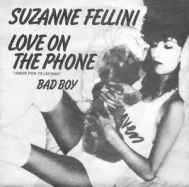 … a pleasantly weird surprise. I was expecting “Love on the Phone” by Suzanne Fellini (#87) to be, frankly, dreadful, and probably disco, but what we have, while not exactly spectacular, has a certain do-it-yourself feel that’s kind of reminiscent of early Blondie. It’s a little bit edgy, as Suzanne suggests she get undressed while talking to her long-distance lover, and the sensualized rat-a-tat of “makin’s” toward the end aren’t exactly rated G, but really, this is pretty chaste as light punk goes; she may be talking dirty, but it’s with a boyfriend out of town. Regardless, it’s really not like anything else we’ve heard so far, and a younger me probably would have played the heck out of this one mainly because it was different and didn’t take itself too seriously. Still, I can’t imagine sitting through a whole album of this.
… a pleasantly weird surprise. I was expecting “Love on the Phone” by Suzanne Fellini (#87) to be, frankly, dreadful, and probably disco, but what we have, while not exactly spectacular, has a certain do-it-yourself feel that’s kind of reminiscent of early Blondie. It’s a little bit edgy, as Suzanne suggests she get undressed while talking to her long-distance lover, and the sensualized rat-a-tat of “makin’s” toward the end aren’t exactly rated G, but really, this is pretty chaste as light punk goes; she may be talking dirty, but it’s with a boyfriend out of town. Regardless, it’s really not like anything else we’ve heard so far, and a younger me probably would have played the heck out of this one mainly because it was different and didn’t take itself too seriously. Still, I can’t imagine sitting through a whole album of this.
I love you, I le-ove you
 I’m having trouble taking “Love’s Only Love” by Engelbert Humperdinck (#83) seriously. The sappy lounge style it’s sung in doesn’t help matters, but that just makes it bad, not ridiculous. No, what makes this song ridiculous is the line I used for the header, which happens for the first time at 1:01: “I love you, I le-ove you.” I’m not doing it justice, because really, you can’t spell the word love the way Engelbert pronounces it that second time. Not only does he make it a two-syllable word, but this love has some sort of quasi-French, or more likely, Dutch, accent to it; it sounds sort of like “loaves” without the S. “Leeuuv”? “Lowv”? Whatever it is, it’s the only word in this whole song that matters, and I wonder how the backup singers don’t break up in giggles hearing it.
I’m having trouble taking “Love’s Only Love” by Engelbert Humperdinck (#83) seriously. The sappy lounge style it’s sung in doesn’t help matters, but that just makes it bad, not ridiculous. No, what makes this song ridiculous is the line I used for the header, which happens for the first time at 1:01: “I love you, I le-ove you.” I’m not doing it justice, because really, you can’t spell the word love the way Engelbert pronounces it that second time. Not only does he make it a two-syllable word, but this love has some sort of quasi-French, or more likely, Dutch, accent to it; it sounds sort of like “loaves” without the S. “Leeuuv”? “Lowv”? Whatever it is, it’s the only word in this whole song that matters, and I wonder how the backup singers don’t break up in giggles hearing it.
I don’t want to be a big star
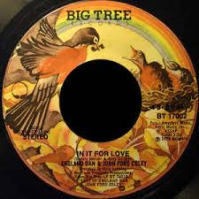 In some parallel universe that isn’t all that different from the one we live in, “In It for Love” by England Dan & John Ford Coley (#75) could have been the theme song for a prime-time sit-com. It has the kind of perky, faux-lounge keyboard that would easily serve as backing to a montage of clips introducing a handful of family members (and the quirky neighbor couple that lives next door). And really, “In it for Love” wouldn’t be a bad name for a family-oriented comedy series. That said, with precious few exceptions, it’s hard to take sit com themes seriously as real music, and anything that sounds like them is, by association, pretty forgettable.
In some parallel universe that isn’t all that different from the one we live in, “In It for Love” by England Dan & John Ford Coley (#75) could have been the theme song for a prime-time sit-com. It has the kind of perky, faux-lounge keyboard that would easily serve as backing to a montage of clips introducing a handful of family members (and the quirky neighbor couple that lives next door). And really, “In it for Love” wouldn’t be a bad name for a family-oriented comedy series. That said, with precious few exceptions, it’s hard to take sit com themes seriously as real music, and anything that sounds like them is, by association, pretty forgettable.
It hurts so much more in the night
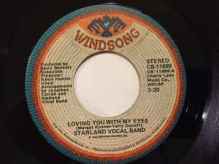 The Starland Vocal Band is the band that made having sex during the daytime something naughty, or at least highlighted that peculiarity in “Afternoon Delight”. So perhaps it’s only natural to expect that musicians with such a narrow range of sexual options would also produce sappy maple-syrup suffused schlock like “Loving You With My Eyes” (#71). The woman in the song may actually be something of a martyr — she promises not to cry if her guy comes back, even if it’s to say goodbye, but it drips so heavily with overwrought sentiment that it makes my teeth hurt. Perhaps it’s the vocal; a woman with this sweet a voice sounds like someone who can be hurt easily. I’m imagining a gravelly-voiced singer, like Kim Carnes, Marianne Faithfull, or Grace Slick, singing this; when a tough woman feels this way, it’s much more believable.
The Starland Vocal Band is the band that made having sex during the daytime something naughty, or at least highlighted that peculiarity in “Afternoon Delight”. So perhaps it’s only natural to expect that musicians with such a narrow range of sexual options would also produce sappy maple-syrup suffused schlock like “Loving You With My Eyes” (#71). The woman in the song may actually be something of a martyr — she promises not to cry if her guy comes back, even if it’s to say goodbye, but it drips so heavily with overwrought sentiment that it makes my teeth hurt. Perhaps it’s the vocal; a woman with this sweet a voice sounds like someone who can be hurt easily. I’m imagining a gravelly-voiced singer, like Kim Carnes, Marianne Faithfull, or Grace Slick, singing this; when a tough woman feels this way, it’s much more believable.
We’re both a little shy, love
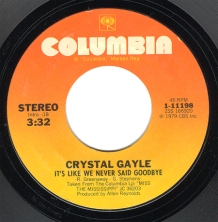 And here’s Crystal Gayle again, with all of her glorious alien locution in tow, singing “It’s Like We Never Said Goodbye” (#63). The content is pleasant enough: everyone likes to think they can have a second chance on the opportunities they missed in the past, and the music is uplifting if not exactly engaging. And that’s really all I have to say — nothing else about this song stands out to me in any way. It doesn’t surprise me in the least that this song stalled at #63, but it shocks me that something so content-less reached #1 on the country charts. I mean, it doesn’t even sound like country.
And here’s Crystal Gayle again, with all of her glorious alien locution in tow, singing “It’s Like We Never Said Goodbye” (#63). The content is pleasant enough: everyone likes to think they can have a second chance on the opportunities they missed in the past, and the music is uplifting if not exactly engaging. And that’s really all I have to say — nothing else about this song stands out to me in any way. It doesn’t surprise me in the least that this song stalled at #63, but it shocks me that something so content-less reached #1 on the country charts. I mean, it doesn’t even sound like country.
“Computer Game”
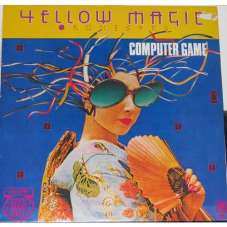 “Computer Game Theme from the Circus” by The Yellow Magic Orchestra (#60), on the other hand, is completely different from even the few new wave songs we’ve heard so far. It’s from Japan; it’s an instrumental; it starts with uncoordinated electronic noises; and it’s not particularly danceable. I’m tempted to label it a novelty song, but it’s definitely not a novelty — the guys who made this track were serious about making this kind of music, in much the same way Kraftwerk and (I guess) Vangelis were (at roughly the same time). What we’re hearing here is early electronica, music the point of which is listening to the interesting things synthesizers can do: electronic music designed to stretch the abilities of noise-making. As a side-note, this some is also evidence of how quickly computers became part of the collective psyche. Space Invaders was the first hit arcade game; it was released in 1978, and here we are less than two years later, with a song on the charts that sounds like Space Invaders. I don’t want to overstate how groundbreaking this song was, but I have to think it was very influential given how big synthpop became and how much hip hop borrowed from synthpop. And, seriously, the Yellow Magic Orchestra went on Soul Train to promote the single, and were probably the weirdest thing that had ever happened to Soul Train until then.
“Computer Game Theme from the Circus” by The Yellow Magic Orchestra (#60), on the other hand, is completely different from even the few new wave songs we’ve heard so far. It’s from Japan; it’s an instrumental; it starts with uncoordinated electronic noises; and it’s not particularly danceable. I’m tempted to label it a novelty song, but it’s definitely not a novelty — the guys who made this track were serious about making this kind of music, in much the same way Kraftwerk and (I guess) Vangelis were (at roughly the same time). What we’re hearing here is early electronica, music the point of which is listening to the interesting things synthesizers can do: electronic music designed to stretch the abilities of noise-making. As a side-note, this some is also evidence of how quickly computers became part of the collective psyche. Space Invaders was the first hit arcade game; it was released in 1978, and here we are less than two years later, with a song on the charts that sounds like Space Invaders. I don’t want to overstate how groundbreaking this song was, but I have to think it was very influential given how big synthpop became and how much hip hop borrowed from synthpop. And, seriously, the Yellow Magic Orchestra went on Soul Train to promote the single, and were probably the weirdest thing that had ever happened to Soul Train until then.
Violet lightning
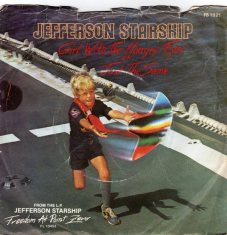 Jefferson Starship is back with “Girl With the Hungry Eyes” (#55), which is something of a hyperkinetic post-apocalyptic lust song, in which a guy who (despite what Einstein’s theories say) can travel at the speed of light meets the daughter of the overlord, who has a perfect fit with perfect lips. It sounds like a match made in heaven, but that’s debatable because there’s a killing floor involved somehow, but whatever, they hook up after all her friends have gone home, so it’s all good. In tone it sounds something like a classic rock band trying to get an edge in on the pogoing punk crowd, and come to think of it, that may be exactly what was happening. It’s fun, and it reminds me in a very good way of Hawkwind’s “Quark, Strangeness, and Charm“, both as a space-aged love song and for it’s fast-paced lightheartedness (and for name-dropping Einstein), but with a deeper instrumentation.
Jefferson Starship is back with “Girl With the Hungry Eyes” (#55), which is something of a hyperkinetic post-apocalyptic lust song, in which a guy who (despite what Einstein’s theories say) can travel at the speed of light meets the daughter of the overlord, who has a perfect fit with perfect lips. It sounds like a match made in heaven, but that’s debatable because there’s a killing floor involved somehow, but whatever, they hook up after all her friends have gone home, so it’s all good. In tone it sounds something like a classic rock band trying to get an edge in on the pogoing punk crowd, and come to think of it, that may be exactly what was happening. It’s fun, and it reminds me in a very good way of Hawkwind’s “Quark, Strangeness, and Charm“, both as a space-aged love song and for it’s fast-paced lightheartedness (and for name-dropping Einstein), but with a deeper instrumentation.
“What I Like About You” by The Romantics (#49) deserves its own entry
When does the heartache end?
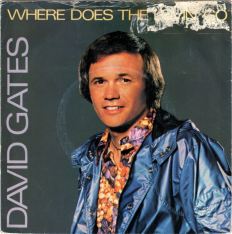 “Where Does the Lovin’ Go“, asks David Gates at #46. I don’t know that I can be bothered to try to answer that question. And I’m having trouble being bothered to discuss this particular song, because it sounds like so many other sickly-sweet someone-done-someone-wrong songs, that it gets hard to say anything intelligent about one that’s so uninteresting as this. Instead, I’m going to ask this: Where do all the forgettable albums go? Back when I was a kid, every record store (there were record stores then, lots of them) had a box or basket or some other display item that held all the non-sellers. They were worth looking through because sometimes you’d find Shriekback or Gang of Four there. Often they were full of albums that were supposed to sell big, but didn’t; I remember in particular seeing a lot of Boz Skaggs in cut-out bins. I imagine David Gates filled a cut-out bin or two in his time, too. But what happens to forgettable albums now that we buy so much of our music digitally? It’s an existential question; they sit in the cloud on Amazon or iTunes, but if no one buys them, if no one remembers to even look for them, can they be said to really be? It’s even weirder than the falling tree in the forest, because the tree undeniably is an object, even if no one is there to hear it fall. But an album that is entirely digital, with no physical presence… it makes no noise if no one is there to hear it, and can it really be said to be there at all if no one looks for it? Like the loving that ceases to exist when it goes away (because love, not being tangible, doesn’t really go anywhere), those forgotten tracks sort of phase out of reality into some sort of cultural quantum state, perhaps never to truly exist again…
“Where Does the Lovin’ Go“, asks David Gates at #46. I don’t know that I can be bothered to try to answer that question. And I’m having trouble being bothered to discuss this particular song, because it sounds like so many other sickly-sweet someone-done-someone-wrong songs, that it gets hard to say anything intelligent about one that’s so uninteresting as this. Instead, I’m going to ask this: Where do all the forgettable albums go? Back when I was a kid, every record store (there were record stores then, lots of them) had a box or basket or some other display item that held all the non-sellers. They were worth looking through because sometimes you’d find Shriekback or Gang of Four there. Often they were full of albums that were supposed to sell big, but didn’t; I remember in particular seeing a lot of Boz Skaggs in cut-out bins. I imagine David Gates filled a cut-out bin or two in his time, too. But what happens to forgettable albums now that we buy so much of our music digitally? It’s an existential question; they sit in the cloud on Amazon or iTunes, but if no one buys them, if no one remembers to even look for them, can they be said to really be? It’s even weirder than the falling tree in the forest, because the tree undeniably is an object, even if no one is there to hear it fall. But an album that is entirely digital, with no physical presence… it makes no noise if no one is there to hear it, and can it really be said to be there at all if no one looks for it? Like the loving that ceases to exist when it goes away (because love, not being tangible, doesn’t really go anywhere), those forgotten tracks sort of phase out of reality into some sort of cultural quantum state, perhaps never to truly exist again…
Someone must’ve kicked you around some
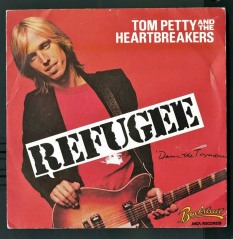 “Refugee” by Tom Petty & The Heartbreakers breaks us out of the sub-40s right up to #15, with blues-rock guitar and vocals delivered in a half-Dylan style. I don’t know what’s going on in the song, but it sounds pretty scary: there’s this girl and she’s been kidnapped, tied up, kicked around, and Tom’s all nonchalant about it. Actually, now I think I do know what’s going on: she’s had a hard life so far and she’s worn-down, tired out, and suffering over it… and then Tom Petty comes around and tells her that life is hard, and it’s time to get past the past and not rely on the world to give her the dignity she needs. It’s an interesting combination of self-reliance and casual indifference that passes as a simple motto for life, or at least the foundation for getting back on one’s feet. I’m not a fan, but I give it kudos for going past clichés to get at ideas that are more complex than those that show up in your radio-standard pop song.
“Refugee” by Tom Petty & The Heartbreakers breaks us out of the sub-40s right up to #15, with blues-rock guitar and vocals delivered in a half-Dylan style. I don’t know what’s going on in the song, but it sounds pretty scary: there’s this girl and she’s been kidnapped, tied up, kicked around, and Tom’s all nonchalant about it. Actually, now I think I do know what’s going on: she’s had a hard life so far and she’s worn-down, tired out, and suffering over it… and then Tom Petty comes around and tells her that life is hard, and it’s time to get past the past and not rely on the world to give her the dignity she needs. It’s an interesting combination of self-reliance and casual indifference that passes as a simple motto for life, or at least the foundation for getting back on one’s feet. I’m not a fan, but I give it kudos for going past clichés to get at ideas that are more complex than those that show up in your radio-standard pop song.
Deeper than any forest primeval
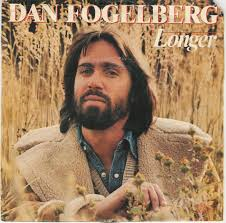 Queen’s “Crazy Little Thing Called Love” did everyone a great service by keeping three songs out of the #1 spot: “Do That To Me One More Time” by Captain & Tennille, “Yes I’m Ready” by Teri Desario and K.C., and this, “Longer” by Dan Fogelberg. Of the three, this is probably the best, and not only because it has a flugelhorn solo in it. As an extended comparison of love to the marvels of nature — the innumerable stars and fish, the deep beauty of untouched forest, and the relief brought by fire in winter and rain in spring — it genuinely has poetic lyrics. It’s calming and soothing, which makes it a fine soundtrack to a quiet afternoon with your lover on the patio… or for a ride on an elevator to visit your ophthalmologist.
Queen’s “Crazy Little Thing Called Love” did everyone a great service by keeping three songs out of the #1 spot: “Do That To Me One More Time” by Captain & Tennille, “Yes I’m Ready” by Teri Desario and K.C., and this, “Longer” by Dan Fogelberg. Of the three, this is probably the best, and not only because it has a flugelhorn solo in it. As an extended comparison of love to the marvels of nature — the innumerable stars and fish, the deep beauty of untouched forest, and the relief brought by fire in winter and rain in spring — it genuinely has poetic lyrics. It’s calming and soothing, which makes it a fine soundtrack to a quiet afternoon with your lover on the patio… or for a ride on an elevator to visit your ophthalmologist.


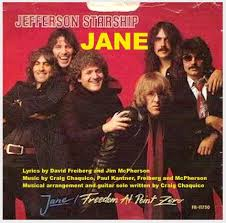
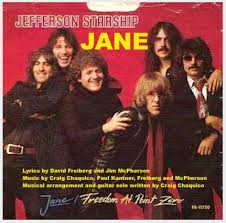 On 19 January, 1980, “
On 19 January, 1980, “